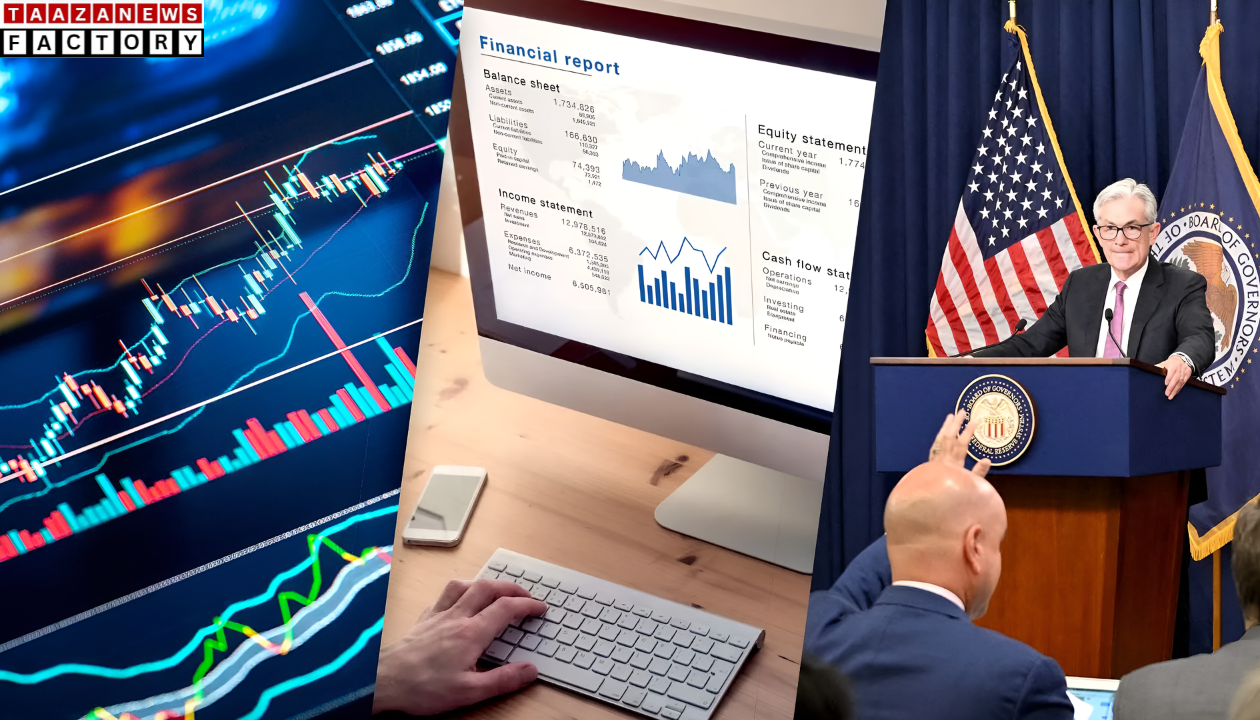Introduction: Stock Market and its Importance
The stock market is an important part of any country’s economy. It is where shares of companies are bought and sold, and is a major means of wealth creation for investors. But the stock market is highly volatile and can be affected by various global, economic, and political events. In this blog, we will discuss the major events that affected the stock market in recent years and try to understand how these events affect the market. This information is based on accurate and reliable sources.
Check fast for the first news of Business & Finance on this WhatsApp channel
1. COVID-19 Pandemic (2020)
The COVID-19 pandemic rocked the global stock markets in 2020. During this time, lockdowns were imposed across the world, shutting down businesses and disrupting supply chains. Fear spread among investors, resulting in a massive drop in the US stock market in March 2020. The Dow Jones Industrial Average (DJIA) fell nearly 13% in a single day, the biggest single-day drop since 1987. However, the US government and Federal Reserve’s stimulus package and interest rate cuts soon stabilised the market. In India too, the Sensex and Nifty witnessed huge volatility, but companies in the online services and pharma sectors outperformed.
2. Trump’s Tariffs and Trade War (2025)
In 2025, tariffs implemented globally by US President Donald Trump caused massive volatility in the stock market. These tariffs, announced in April 2025, raised duties on imports from Canada, Mexico, China and 185 other countries by 25-40%. This led to a capital loss of $2 trillion to $10 trillion in global markets. The S&P 500 fell 4.8%, its worst day since 2020. However, the market recovered by 9.5% after the announcement of a 90-day tariff moratorium. Emerging markets like India were also impacted as uncertainty in global trade dented investor confidence.
3. Global Financial Crisis of 2008
The 2008-2009 financial crisis was one of the biggest crises in the history of the stock market. The crisis was triggered by a drop in the value of residential mortgage-backed securities in the US. Several large financial institutions went bankrupt, and investors began withdrawing funds from the market. The S&P 500 declined by nearly 60% from October 2007 to March 2009. In India, the Sensex fell from 21,000 to 8,000 points. The crisis taught long-term investors to be cautious of market volatility.
4. Black Monday of 1987
On October 19, 1987, known as Black Monday, the Dow Jones Industrial Average fell 22.6%, the largest single-day drop in the history of the US stock market. The decline was accelerated by automated program trading and portfolio insurance strategies, which further fueled the sell-off. The event led to the introduction of safety measures such as circuit breakers in the market, which are still in use today. The impact of the stock market in India at the time was limited, but it was a lesson for global investors that technical risks can also affect the market.
5. Geopolitical tensions and wars
Geopolitical events, such as the Russia-Ukraine War (2022) and the Israel-Hamas conflict, also affected the stock markets. The Russia-Ukraine war led to a surge in crude oil and natural gas prices, which led to inflation in import-dependent countries such as Europe and India. This led to volatility in the stock markets, especially in the energy and automobile sectors. In India, the Sensex fell by 1,689 points at the start of the war. Similarly, the 1973 OPEC oil crisis had also affected global markets, leading to a decline of 51.9%.
6. Economic Policies and Interest Rates
Monetary policies of central banks, such as the Federal Reserve in the US and the Reserve Bank of India (RBI) in India, directly affect the stock market. For example, when the RBI raises interest rates, borrowing becomes costlier, affecting the profitability of companies and stock prices. In 2025, fluctuations in global interest rates and tariff uncertainties kept the market volatile. Investors should keep an eye on these policies, as they determine the direction of the market.
Conclusion: Resilience in Stock Market
History shows that falls and volatility are normal in the stock market, but it always recovers. Whether it is the Great Depression of 1929, the financial crisis of 2008, or the pandemic of 2020, the market has bounced back each time. Long-term investors who maintain a diversified portfolio and are patient during market volatility eventually make profits. Investors are advised to invest based on their risk tolerance and financial goals and keep a watch on market events.
Check fast for the first news of Business & Finance on this WhatsApp channel
Frequently Asked Questions (FAQs)
- What causes a sudden drop in the stock market?
- Economic crises, geopolitical tensions, or policy changes can cause a market crash.
- How did COVID-19 affect the stock market?
- Lockdowns and supply chain disruptions caused the market to drop sharply.
- What are tariffs and how do they affect the market?
- Tariffs are taxes on imports that can escalate trade wars and market volatility.
- What was Black Monday?
- The 22.6% drop in the Dow Jones in 1987, which was caused by a tech sell-off.
- Does the stock market always recover?
- Yes, the market has recovered after every crisis in history.
Also Read:
Swara Bhaskar’s net worth: Owner of crores, charges such a huge amount for a film
Tilak Varma Net Worth: Earnings in crores from cricket and journey to a luxurious lifestyle









